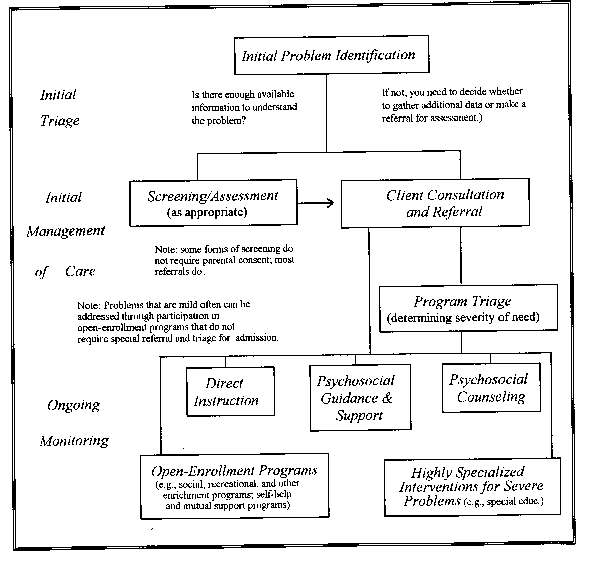

In responding to the mental health and psychosocial concerns of students, school staff make a variety of decisions. This figure and the outline on the following page highlight matters to be considered as a school develops its systems for problem identification, triage, referral, and management of care.

The following outline highlights matters to be considered as a school develops its systems for problem identification, triage, referral, and management of care.
Problem identification
(a) Problems may be identified by anyone (staff, parent, student).
(b) There should be an Identification Form that anyone can access
and fill out.
(c) There must be an easily accessible place for people to turn in
forms.
(d) All stakeholders must be informed regarding the availability of
forms, where to turn them in, and what will happen after they do so.
Triage processing
(a) Each day the submitted forms must be reviewed, sorted, and
directed to appropriate resources by a designated and trained triage
processor. Several individuals can share this task; for example,
different persons can do it on a specific day or for specified weeks.
(b) After the sorting is done, the triage processor should send a
Status Information Form to the person who identified the problem
(assuming it was not a self-referral).
Clients directed to resources or for further problem analysis and recommendations
(a) For basic necessities of daily living (e.g., food, clothing,
etc.), the triage processor should provide information about resources
either through the person who identified the problem or directly to the
student/family in need.
(b) If the problem requires a few sessions of immediate counseling to
help a student/family through a crisis, the triage processor should send
the form to the person who makes assignments to on-site counselors.
(c) The forms for all others are directed to a small triage "team"
(1-3 trained professionals) for further analysis and recommendations.
(If there is a large case load, several teams might be put into operation.)
Members of such a team may not have to meet on all cases; some could be
reviewed independently with recommendations made and passed on the next
reviewer for validation. In complex situations, however, not only might
a team meeting be indicated, it may be necessary to gather more
information from involved parties (e.g., teacher, parent, student).
Interventions to ensure recommendations and referrals are pursued appropriately
(a) In many instances, prereferral interventions should be recommended.
This means a site must be equipped to implement and monitor the impact of
such recommendations.
(b) When students/families are referred for health and social
services, procedures should be established to facilitate motivation and
ability for follow-through. Care management should be designed to
determine follow-through, coordination, impact, and possible need for
additional referrals.
(c) Referrals to assess the need for special or compensatory education
often are delayed because of a waiting list. Back logs should be monitored
and arrangements made to catch-up (e.g., by organizing enough released
time to do the assessments and reviews).
Management of care (case monitoring and management)
(a) Some situations require only a limited form of monitoring (e.g.,
to ensure follow-through). A system must be developed for assigning care
monitors as needed. Aides and paraprofessionals often can be trained to
for this function.
(b) Other situations require intensive management by specially trained
professionals to (1) ensure interventions are coordinated/integrated and
appropriate, (2) continue problem analysis and determine whether
appropriate progress is made, (3) determine whether additional assistance
is needed, and so forth. There are many models for intensive management
of care. For example, one common approach is to assign the responsibility
to the professional who has the greatest involvement (or best
relationship) with the student/family.
(c) One key and often neglected function of the care manager is to
provide appropriate status updates to all parties who should be kept
informed.